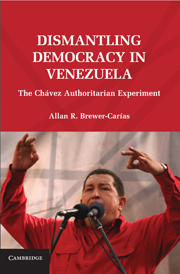Book contents
- Frontmatter
- Contents
- AUTHOR'S NOTE
- INTRODUCTION DEFRAUDING DEMOCRACY THROUGH NONCONSENSUAL CONSTITUENT ASSEMBLIES
- PART ONE THE POLITICAL ASSAULT ON STATE POWERS AND THE FRAMEWORK FOR AUTHORITARIANISM
- PART TWO INSTITUTIONAL DEVELOPMENT TOWARD CONSOLIDATING AUTHORITARIANISM
- PART THREE CONSTITUTIONAL REFORMS DESIGNED TO CONSOLIDATE AUTHORITARIANISM
- Chapter 10 THE FAILED ATTEMPT TO CONSOLIDATE AN AUTHORITARIAN AND ANTIDEMOCRATIC POLITICAL SYSTEM IN THE CONSTITUTION
- Chapter 11 THE FAILED ATTEMPT TO CONSOLIDATE A CENTRALIZED STATE IN THE CONSTITUTION
- Chapter 12 THE FAILED ATTEMPT TO CONSOLIDATE A SOCIALIST CENTRALIZED ECONOMIC SYSTEM IN THE CONSTITUTION
- Chapter 13 THE IRREGULAR FRAUDULENT IMPLEMENTATION OF THE REJECTED CONSTITUTIONAL REFORM THROUGH LEGISLATION
- Chapter 14 THE ILLEGITIMATE MUTATION OF THE CONSTITUTION THROUGH JUDICIAL CONSTITUTIONAL INTERPRETATION
- Chapter 15 THE ALTERNATE PRINCIPLE OF GOVERNMENT AND THE 2009 CONSTITUTIONAL AMENDMENT ON CONTINUOUS REELECTION
- FINAL REFLECTIONS: THE RIGHT TO DEMOCRACY AND ITS VIOLATION BY VENEZUELA'S AUTHORITARIAN GOVERNMENT: SOME RELEVANT FACTS FROM THE PAST DECADE
- INDEX
Chapter 15 - THE ALTERNATE PRINCIPLE OF GOVERNMENT AND THE 2009 CONSTITUTIONAL AMENDMENT ON CONTINUOUS REELECTION
Published online by Cambridge University Press: 05 June 2012
- Frontmatter
- Contents
- AUTHOR'S NOTE
- INTRODUCTION DEFRAUDING DEMOCRACY THROUGH NONCONSENSUAL CONSTITUENT ASSEMBLIES
- PART ONE THE POLITICAL ASSAULT ON STATE POWERS AND THE FRAMEWORK FOR AUTHORITARIANISM
- PART TWO INSTITUTIONAL DEVELOPMENT TOWARD CONSOLIDATING AUTHORITARIANISM
- PART THREE CONSTITUTIONAL REFORMS DESIGNED TO CONSOLIDATE AUTHORITARIANISM
- Chapter 10 THE FAILED ATTEMPT TO CONSOLIDATE AN AUTHORITARIAN AND ANTIDEMOCRATIC POLITICAL SYSTEM IN THE CONSTITUTION
- Chapter 11 THE FAILED ATTEMPT TO CONSOLIDATE A CENTRALIZED STATE IN THE CONSTITUTION
- Chapter 12 THE FAILED ATTEMPT TO CONSOLIDATE A SOCIALIST CENTRALIZED ECONOMIC SYSTEM IN THE CONSTITUTION
- Chapter 13 THE IRREGULAR FRAUDULENT IMPLEMENTATION OF THE REJECTED CONSTITUTIONAL REFORM THROUGH LEGISLATION
- Chapter 14 THE ILLEGITIMATE MUTATION OF THE CONSTITUTION THROUGH JUDICIAL CONSTITUTIONAL INTERPRETATION
- Chapter 15 THE ALTERNATE PRINCIPLE OF GOVERNMENT AND THE 2009 CONSTITUTIONAL AMENDMENT ON CONTINUOUS REELECTION
- FINAL REFLECTIONS: THE RIGHT TO DEMOCRACY AND ITS VIOLATION BY VENEZUELA'S AUTHORITARIAN GOVERNMENT: SOME RELEVANT FACTS FROM THE PAST DECADE
- INDEX
Summary
One of the main reform proposals contained in the 2007 rejected constitutional reform was the one seeking to establish the continuous and indefinite reelection of the president of the republic, eliminating the restrictions established in the 1999 Constitution.
Nonetheless, and despite the popular rejection of the reform, the matter continued to be proposed and eventually was the object of a constitutional amendment approved by the National Assembly, submitted to a referendum held on February 15, 2009. The result was the popular approval of the constitutional amendment, which changed the traditional principle of the alternate character of the democratic government of Venezuelan constitutionalism, allowing the continuous and indefinite reelection not only of the president but also of all elected public officials. This constitutional amendment defrauded the prohibition established in the Constitution to submit to popular vote the same constitutional reform proposal during the same constitutional term and, in addition, violated the Constitution by eliminating one of the unchangeable constitutional principles as it was the alternation in government.
THE REPUBLICAN PRINCIPLE OF ALTERNATE GOVERNMENT AND THE VENEZUELAN TRADITION OF NO REELECTION
In effect, the general restriction on elected officials' continuous reelection has been a tradition of Venezuela's constitutional history – since Venezuela adopted the presidential system of government in 1811, as occurred in all Latin America countries.
The restriction on presidential reelection was first established in the 1830 Constitution as a reaction to continuity in office (continuísmo), precisely to confront individuals' desire to perpetuate themselves in power and to avoid the advantages that public officials might have in electoral processes.
- Type
- Chapter
- Information
- Dismantling Democracy in VenezuelaThe Chávez Authoritarian Experiment, pp. 359 - 366Publisher: Cambridge University PressPrint publication year: 2010

